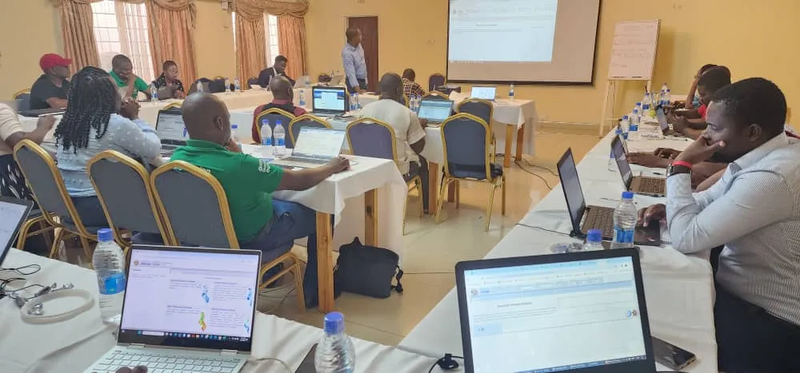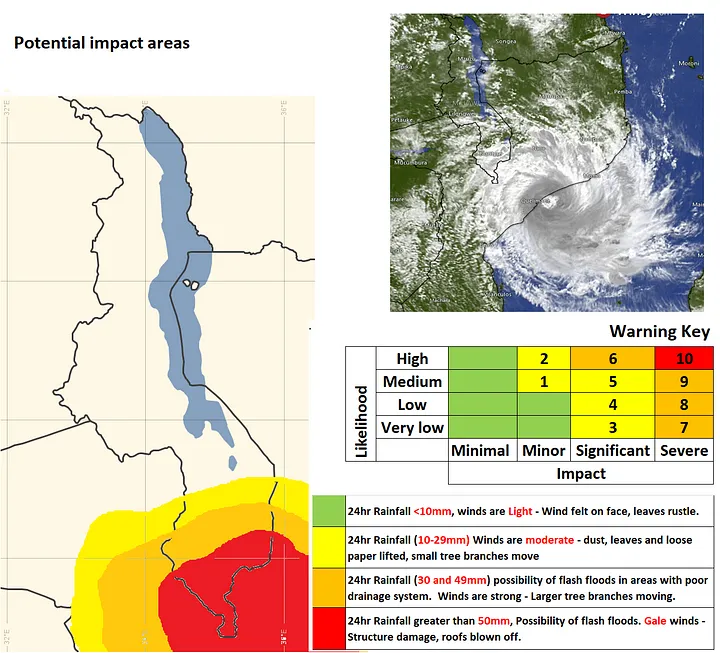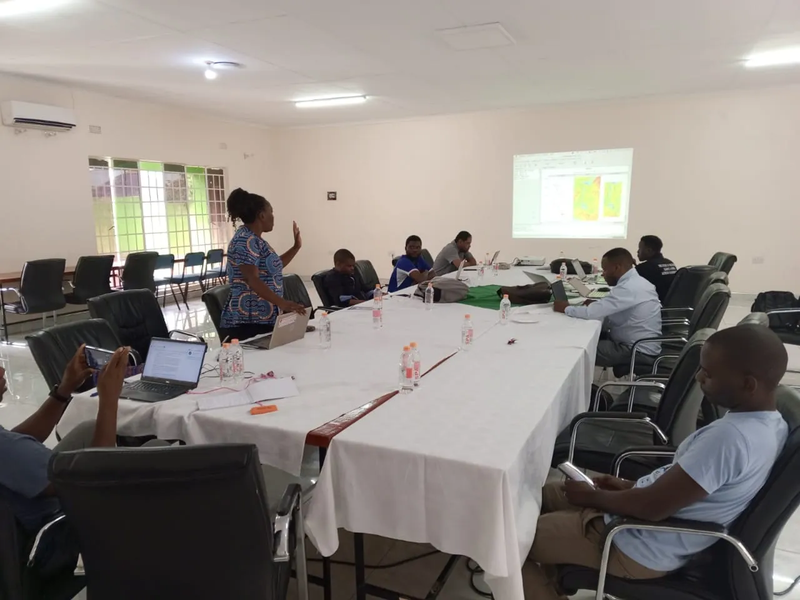Early Warning Systems, Making Malawi More Resilient
Like many African nations, Malawi faces severe threats from climate change, especially extreme weather. To combat this challenge, the Climate Risk Early Warning Systems (CREWS) initiative established a project titled “Strengthening Risk Informed Planning, Hydro Meteorological and Early Warning Services” to revolutionize how Malawian communities prepare for and respond to weather hazards. CREWS, a mechanism funding Least Developed Countries (LDCs) and Small Island Developing States (SIDS) for early warning systems, is implemented by the World Meteorological Organization (WMO), World Bank (WB), and United Nations Office for Disaster Risk Reduction (UNISDR).
This interview dives into the project’s strategies to improve early warnings, engage vulnerable populations, and empower local institutions for long-term resilience. Collison Lore spoke to Hussein Milanzi, Chief Meteorologist at the Department of Climate Change and Meteorological Services (DCCMS) in Malawi, on the current state of the project and its impact on the lives of vulnerable Malawian communities.

Qtn. How will CREWS improve the accuracy and timeliness of early warnings for weather hazards like floods and droughts in Malawian communities?
Ans. The project aims to enhance the accuracy and timeliness of early warnings for weather hazards like floods and droughts in Malawian communities through a strategic approach, that is multi-stakeholder embracing. For instance, strengthened data collection and monitoring, targeting the Department of Climate Change and Meteorological Services (DCCMS) in acquiring, installing, and operationalizing advanced weather and climate platforms. These platforms comprise the following among others.
- ENACTS Maproom
- Climate Toolkit
- Climate Weather Watch System
- Drought Monitoring System
One area that the project has placed emphasis on is improved forecasting capabilities. By providing access to these sophisticated platforms, CREWS will equip the DCCMS with the latest tools and data for more accurate weather forecasting and hazard prediction. Last but not least, the readily available data from these platforms will enable the DCCMS to generate timelier and more precise early warnings for floods, droughts, and other weather-related hazards.
To address gaps, in meteorological data and access to climate information, the Enhancing National Climate Services (ENACTS) initiative has been implemented in Malawi. This is in response to increased demand for the delivery of sector specific weather, water and climate services. In order to ensure food security, improved water resource management, air and lake navigation, and improved health. Maproom as one of the platforms, is an important tool for facilitating the access and wider use of climate information in decision making by governments, as well as public and private sectors. A week long Maproom stakeholder training involving academia, government sectors and other partners, facilitated by DCCMS and the International Research Institute for Climate and Society (IRI) was successfully undertaken at Mango Lodge, Zomba District.

ICT solutions such as Maproom and more specifically the co-created map visualizations such as DCCMS’s interactive online maps and graphs of climate data emerging from this platform will play a greater role in making climate information more useable by providing location specific (4 km resolution) historical, monitoring and forecast response for the agricultural sector and wider food system. The platform also plays an important role in informing decisions in other climate sensitive sectors such as water, health and disaster risk management.
Qtn. How is CREWS engaging with Malawian farmers and other vulnerable populations to ensure early warnings are reaching them in a usable format and considering their specific needs?
Ans. The CREWS project is engaging with Malawian farmers and other vulnerable populations to ensure early warnings are reaching them in a usable format and considering their specific needs by taking part in the seasonal forecasting. The process starts at the regional level encompassing the countries under Southern Africa Development Corporation (SADC), where, CREWS project supports one DCCMS staff member to take part in the Southern Africa Regional Climate Outlook Forum (SARCOF), thereafter the project supports the National Climate Outlook
Forums (NACOF) process where all the stakeholders including the farmers and other vulnerable populations are represented. This is the platform where DCCMS releases the outlook of the incoming rainfall seasons. The stakeholders present are given a chance to discuss the imprecations of the season in their respective sectors. The other initiatives such as the Participatory Scenario Planning PSP and PICSA take the information further to the grassroots using already established avenues like the district, area and village committees and farmers.

Qtn. What mechanisms are being put in place to ensure effective communication and coordination between Malawian government agencies, humanitarian organizations, and local communities in the event of a weather disaster?
Ans. The project has put deliberate efforts into activating and operationalizing the Early Warning Committee in Malawi by supporting the regular meetings. This committee is comprised of government agencies, humanitarian organizations, and local government representatives.
The administrative structures in Malawi under Department of Disaster Management Affairs (DoDMA) flow along; National, District, Area and Village Committees. Through these committees’ communication and coordination is made seamless by strengthening the chain of communication from National to Village and back as information also flows from communities on what is happening on the ground to the National level for intervention and further actions. The DoDMA works hand in hand with the Red Cross-Malawi in managing the committees for effective communication and coordination.
Qtn. How is CREWS building the capacity of Malawian institutions, such as the Department of Climate Change Meteorological Services, to improve long-term weather forecasting and climate data collection?
Ans. CREWS is enhancing the capabilities of Malawian institutions, particularly the Department of Climate Change and Meteorological Services (DCCMS), to strengthen long-term weather forecasting and climate data collection through a multi-pronged approach.
CREWS is on the forefront of promoting both equipment and technology transfer in the context if Malawi, the project is facilitating the acquisition, installation, and operationalization of advanced weather and climate monitoring platforms for the DCCMS.
The project is providing comprehensive capacity building/ training for DCCMS staff on the installation, maintenance, and effective utilization of these new platforms. Skills Development is also on the agenda of the project, whereby i offers targeted refresher courses on weather observation and forecasting techniques to further enhance the expertise of DCCMS personnel. CREWS is additionally supporting training and capacity building initiatives for both operators and users of the Operational Decision Support System (ODSS). This training targets staff from the DCCMS and the Department of Water Resources.
Qtn. What are the expected long-term benefits of CREWS Malawi’s disaster risk reduction and climate change adaptation strategies?
Ans. The CREWS project offers significant long-term advantages for Malawi’s efforts in disaster risk reduction (DRR) and climate change adaptation (CCA). The project has provided support for evaluating Malawi’s Multi-hazard Early Warning System. The findings from this assessment will be instrumental in formulating improved DRR and CCA strategies, ultimately leading to a more resilient Malawi.
CREWS is contributing to the development of a strategic plan for the Department of Climate Change and Meteorological Services (DCCMS). This plan will enhance the department’s capacity to effectively address climate-related challenges.

The creation of a Monitoring and Evaluation (M&E) framework for tracking the implementation of the National Framework for Climate Services (NFCS). This framework will ensure accountability and facilitate continuous improvement in climate service delivery, also constitutes part of the project brief.
CREWS will assist in developing flood risk management strategies specifically for Zomba and Mzuzu, two cities highly vulnerable to flooding. These strategies will provide targeted measures to protect communities and infrastructure in these areas.
Most significantly, CREWS support the design and establishment of a Disaster Risk Management Fund. This fund will provide a sustainable source of financing for future DRR and CCA initiatives in Malawi.

